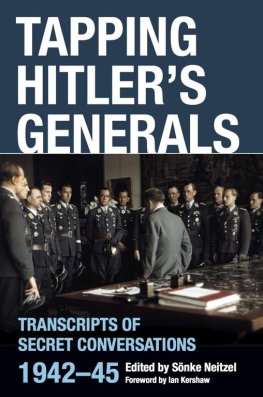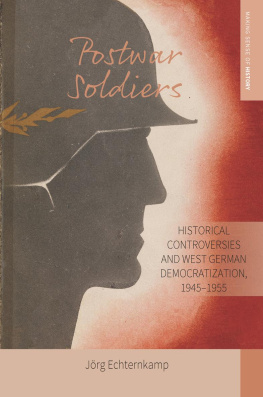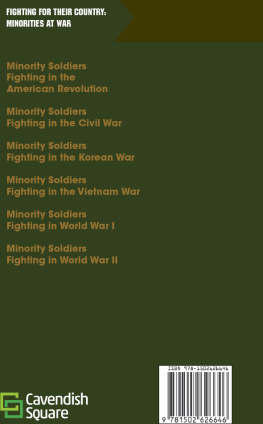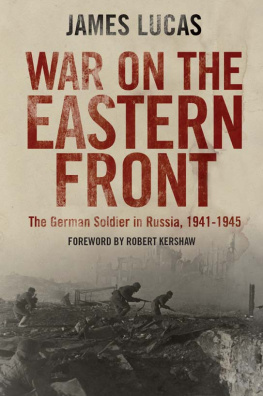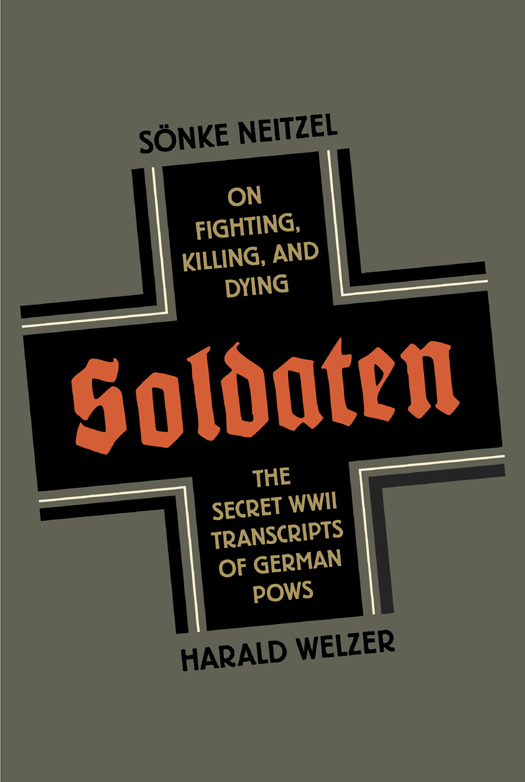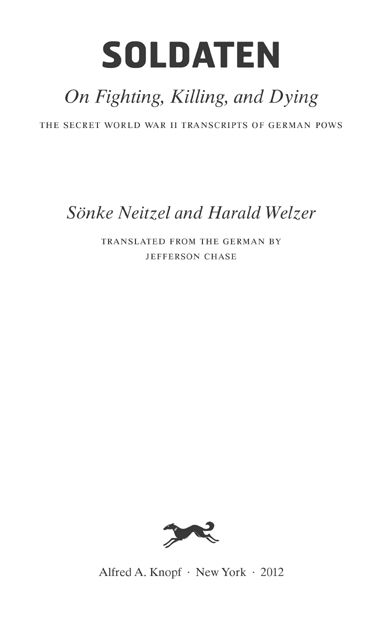THIS IS A BORZOI BOOK
PUBLISHED BY ALFRED A. KNOPF
Translation copyright 2012 by Alfred A. Knopf, a division of Random House, Inc.
All rights reserved. Published in the United States by Alfred A. Knopf, a division of Random House, Inc., New York, and in Canada by McClelland & Stewart, a division of Random House of Canada, Limited, Toronto.
www.aaknopf.com
Originally published in Germany as Soldaten: Protokolle vom Kmpfen, Tten und Sterben by S. Fischer Verlag GmbH, Frankfurt am Main, in 2011. Copyright 2011 by Snke Neitzel and Harald Welzer, copyright 2011 S. Fischer Verlag, GmbH.
Knopf, Borzoi Books, and the colophon are registered trademarks of Random House, Inc.
Library of Congress Cataloging-in-Publication Data
Neitzel, Snke.
Soldaten / by Snke Neitzel and Harald Welzer; translated from the German by Jefferson Chase.
p. cm.
Translation of: Soldaten: Protokolle vom Kmpfen, Tten und Sterben. Frankfurt am Main : Fischer Verlag, 2011.
Includes bibliographical references.
eISBN: 978-0-307-95815-0
1. World War, 19391945Military intelligenceGreat Britain. 2. World War, 19391945Prisoners and prisons, British. 3. Prisoners of warGermanyAttitudesSources. 4. Prisoners of warGreat BritainAttitudesSources. 5. World War, 19391945Anecdotes. 6. EavesdroppingGreat Britain. 7. SoldiersGermanyAttitudesSources. 8. GermanyArmed ForcesHistory20th centurySources. I. Welzer, Harald. II. Title.
D810.S7N37313 2012
940.54724108931dc23
2012005744
Cover design by Peter Mendelsund
v3.1
C ONTENTS
P ROLOGUES
Snke Neitzel
It was a typical November day in England: a blanket of clouds, misty rain, eight degrees Celsius. As Id often done before, Id taken the District Line to Kew Gardens, getting out at the picturesque tube station in South London and hastening to the British national archives to immerse myself in old documents. The rain was even more unpleasant than usual and made me quicken my pace. As always, at the Archives entrance there was an impressive number of security personnel who gave my bag a cursory search. I passed by the small bookshop and went to the coatroom, then proceeded up the stairs to the reading room, where the garish green carpet convinced me that nothing had changed since the last time Id been here.
In autumn 2001, I was working as a visiting lecturer at the University of Glasgow and was on a short visit to London. A few weeks previously, I had stumbled across Michael Gannons book about the turning point in the Battle of the Atlantic in May 1943. It contained several pages of minutes of discussions among German U-boat crewmen, and that had made me curious. I was aware of the existence of reports about interrogations of German POWs, but I had never heard anything about reports based on covert surveillance, and I wanted to follow up the lead. I wasnt expecting anything much. What could such reports consist of? A couple of pages of random conversations, recorded by someone somewhere. Countless times before, promising indications of potential new sources had led to dead ends.
But this time it was different. At the desk Id been assigned, I found a thick bundle of files, perhaps totaling eight hundred pages, held together only by a string. The thin sheets of paper were still immaculately organized. I had to be one of the first people to have ever held them in his hands. I glanced over seemingly endless protocols of German navy men, mostly U-boat crew members, transcribed word for word. If such reports existed for September 1943, I reasoned, there would have been similar ones for October and November 1943 as well. And what about the rest of the war? Indeed, as I discovered, there were thick bundles covering other months as well. Gradually, I realized that this was only the tip of the iceberg. In my excitement, I kept ordering more and more documents and found that not only submarine crews but captured members of the German air force and army had been subjected to covert surveillance as well. I delved into their conversations and was sucked in by the internal world of war that unfolded before me. You could practically hear the soldiers talking, gesticulating, and arguing among themselves. What most surprised me was how openly they talked about fighting, killing, and dying. I flew back to Glasgow with some interesting photocopied passages in my bag. The following day, I bumped into Professor Bernard Wasserstein at the Department of History and told him about my discovery. This was a brand-new source, I related, and would probably make a good topic for a dissertation for someone else. You want to give it away? he asked in amazement. The question burned itself into my head. He was right. I myself had to excavate this particular buried treasure.
I kept going back to London and gradually began to comprehend what I had stumbled upon. Over the course of the war, the British intelligence service had systematically subjected thousands of German and hundreds of Italian POWs to covert surveillance, recording passages from conversations they found particularly interesting on wax records and making protocols of them. The protocols had survived the war in their entirety and had been declassified in 1996. But in the years that followed, no one had recognized their value as historical source material. Undiscovered, they were left hibernating on the archive shelves.
In 2003, I published the first excerpts, and two years later a book edition followed containing some two hundred protocols from conversations among German generals. But I had still only made scant progress in evaluating and interpreting this source material. A short time later, I discovered a similar collection of materialsome 100,000 pages worth, twice as extensive as the British filesin the National Archives in Washington, D.C. It was clear that there was no way I could process this seemingly infinite quantity of material on my own.
Harald Welzer
I was speechless when Snke Neitzel called me and told me about the source material he had found. Previously we had been forced to base our research on perceptions help of content-recognition software. Now, after three years of work, in which we learned a lot that was new and in which we were forced to question a number of truisms our sources failed to bear out, it is time to present the first results of our research.
A UTHORS N OTE
In the excerpts from the surveillance protocols, British and American intelligence agencies used parentheses to indicate omissions. They also indicated garbled names and places with question marks. Authors clarifications are indicated with brackets.
I heard of a case of two fifteen-year-old boys. They were wearing uniform and were firing away with the rest. But they were taken prisoners. A corporal in hospital told me that. They were wearing soldiers uniform, so what could one do. And I myself have seen that there are twelve-year-old boys in the
This story, as told by Staff Sergeant Schmid on June 20, 1942, typifies how the soldiers talk in the protocols. As in all everyday conversations, the speaker repeatedly changes the subject, following a chain of associations. In the middle, when Schmid is talking about music, it occurs to him how much he enjoys Russian music, whereupon he briefly describes it before continuing his narrative. Schmids anecdote begins harmlessly enough, but turns truly horrific at the end with the execution of the two young Russian soldiers. The narrator reports that not only were the two youths murdered, they were made to dig their own graves. The execution runs into a complication, and that leads to the eventual moral of the story. The young soldier about to be killed proves fanatic or idealistic, eliciting the staff sergeants admiration.


